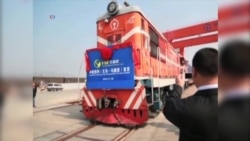The longest rail link in the world is operational, after a train carrying goods from China arrived in the Spanish capital, Madrid, last month. The railway has been dubbed the ‘21st-century Silk Road’ and is the latest landmark investment by China aimed at improving the infrastructure along the old trading routes between east Asia and Europe. The European Union is China’s biggest trading partner, and Beijing’s money is being welcomed in Europe.
The diesel locomotive slowly pulled away from the Chinese coastal city of Yiwu - known as the world’s biggest marketplace - in November.
Thirteen-thousand kilometers and three weeks later, the 40 containers arrived in the Spanish capital, Madrid, in time for Christmas - halving the time taken by ship. It is due to return laden with Spanish wine and produce in time for the Chinese New Year in February. Jonathan Fenby, author of the book "Will China Dominate the 21st Century?," says China wants to improve infrastructure to boost trade.
“These things are developing and they are going to go on developing I think. There’s a rail link now from Chongqing in southwest China through Russia, which ends in Duisberg in Germany," said Fenby.
Freight rail links now connect Germany and China five times a week, transporting everything from parts for BMW cars to Hewlett Packard computers. Fenby says Berlin is leading the field.
“All the other EU countries have been kind of overawed or impressed, by German success - both in exporting to China and in setting up big joint ventures. Companies like Siemens, the motor companies, chemical companies," he said.
China is investing heavily in European infrastructure. Premier Li Keqiang attended the opening of a $167 million, Chinese-built bridge over the River Danube in Serbia last month. His Serbian counterpart, Aleksandar Vucic, hailed the investment.
"The first feat of Chinese builders in Europe and an eternal monument to Sino-Serbo friendship. We will achieve many of these projects with our Chinese friends. There will be new bridges and new paths to the future," said Vucic.
Those plans include the construction of a $1.9 billion high speed rail link between Belgrade and Budapest in Hungary.
China’s foreign minister, Wang Yi, said Monday the huge investments in overseas infrastructure are part of a new approach to global relations.
"As of the end of 2014, China had established over 70 strategic and cooperative relationships, covering major countries and regions around the globe. "This means China is taking a new road of building partnerships rather than setting up alliances, " said Yi.
China’s ‘Silk Road Dream’ dance troupe has been performing across south Asia in recent months to highlight China’s vision of re-establishing the old trade routes. Beijing has pledged $40 billion to improve infrastructure.
Jonathan Fenby says the foreign investment drive aims to strengthen Beijing’s presence on the world stage - but it is also partly enforced by falling domestic growth.
“A lot of structural weaknesses in China. Everything from the financial system to the environment. And we’re at a point now where I think the present Chinese leadership first of all is ready to accept slower growth. But also there is an awareness in China of the need to get to grips with all these big problems," he said.
With Europe facing economic stagnation, the Chinese investment has been welcomed - and analysts note that European concerns over human rights and democracy in China take a back seat.





